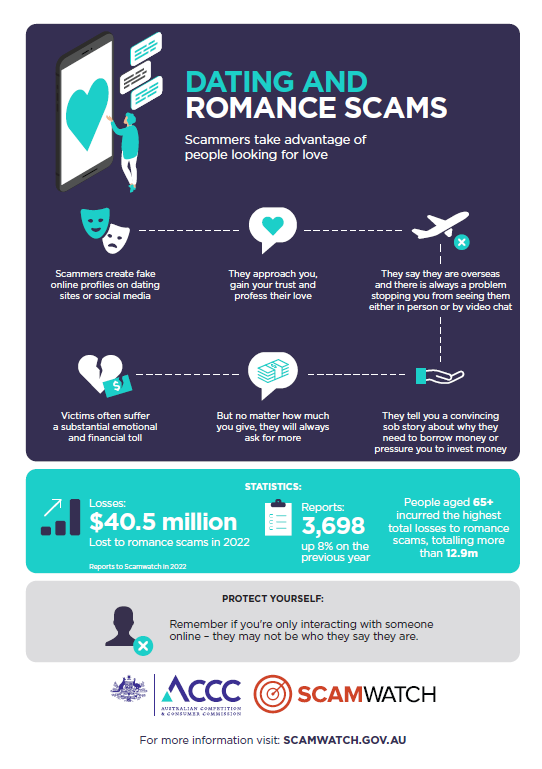Australians are being urged to have a heart-to-heart with their friends and family members this Valentine's Day, as they can play a vital role in protecting their loved ones from the heartache caused by scams.
New Scamwatch data reveals more than $40 million was lost to romance scams in 2022.
There were 3,698 reports of romance scams made to the ACCC's Scamwatch in 2022, up eight per cent compared to the previous year. Close to half of these reports involved scammers with fake profiles contacting their victims via mobile apps and social networking platforms.
"Scammers are cold-hearted criminals who use unscrupulous tactics to trick their victims into sharing their personal details and emptying their wallets. As more Australians meet people through social media and mobile dating apps, it has never been more important to be absolutely sure of who you are communicating with," ACCC Deputy Chair Catriona Lowe said.
"That's why we are asking Australians to check in with the people they love and to help them recognise the signs if a person they've met online isn't real."
"Romance scammers will pull on their victim's heartstrings to get what they want. We know of an Australian woman who lost more than $250,000 after an online relationship with a man who claimed to be an overseas doctor needing money for medical equipment."
"Distressing romance scam stories are sadly all too common and highlight the need for friends, family, businesses and the community to talk more about scams," Ms Lowe said.
"If you are concerned that someone you know could be involved in a romance scam, have a calm conversation with them and ask gentle questions about the nature of the relationship, such as why they haven't been able to video chat or meet in person."
"Warn them not to share personal photos or videos as these can be used by scammers to blackmail their victims and tell them to contact their bank immediately if they have lost money," Ms Lowe said.
Signs of a romance scam
They can't meet in person. The scammer will say they live somewhere overseas or interstate. Reasons vary, but usually the scammer will say they are either military, United Nations, doctors or even working on an oil rig.
They try to evoke empathy. Scammers often present a story of being divorced or widowed with a child or children.
They need help with a crisis. Once trust and a relationship is established, scammers will commonly ask for money to help with illness, injury, travel costs or a family crisis.
Scammers will claim to be financially stable but ask for money. Sometimes, there's a 'deal' or 'contract' that will result in a guaranteed payment soon; they just need money to finalise it. Or they are being detained and need help getting out of the country. The scenarios are extensive.
They may ask you to invest. Known as romance-baiting, scammers commonly use romance scam grooming tactics to gain their victim's trust before luring them into an investment scam.
Romance scammer tactics
Scammers will declare their love quickly and contact you often. Scammers spend time 'grooming' their victims with techniques such as professing their love in a relatively short period or sharing emotionally evoking personal stories. They may even send gifts.
They will try and move you off the platform or app. If they met through a mobile app, they may suggest moving the relationship away to a more private channel such as phone, email, or instant messaging such as WhatsApp. By moving onto other platforms, logs of their interactions are not available to law enforcement and the platform won't be able to delete their profile.
They will become more desperate and may pressure you. If the victim doesn't send money straight away, their messages and calls become more desperate, persistent or direct. If they do send money, they continue to ask for more.
Top tips for avoiding scams
- Stop - take your time before giving money or personal information.
- Think - ask yourself if the message or call could be fake?
- Protect - act quickly if something feels wrong. Contact your bank and report scams to Scamwatch.
Background
The ACCC's Scamwatch continues to work with other government agencies, law enforcement and the private sector to share intelligence, disrupt scams, advocate for consumers and raise awareness in the community.
In the October budget, the ACCC received seed funding from the government to scope and plan for a new National Anti-Scams Centre to support the community in the fight against scams.
If you have experienced cybercrime and lost money online, you can report to police via ReportCyber.
If you have given personal information to a scammer contact IDCARE.
Australians, regardless of whether they have lost money, are encouraged to report scams and learn more about how to get help on the Scamwatch website scamwatch.gov.au. Follow Scamwatch on Twitter or subscribe to radar alerts.
For crisis support to help with emotional distress about scams contact Lifeline on 13 11 14 or access support via the online chat between 7pm and midnight www.lifeline.org.au. Beyond Blue also provides support for anxiety and depression 1300 22 4636 or chat online www.beyondblue.org.au.







